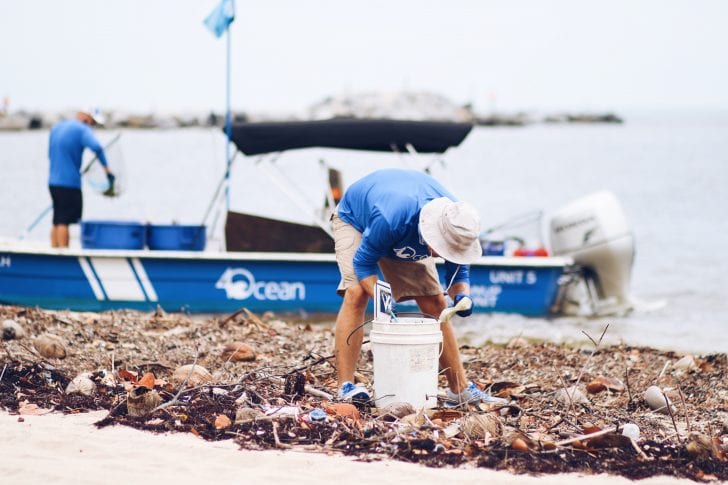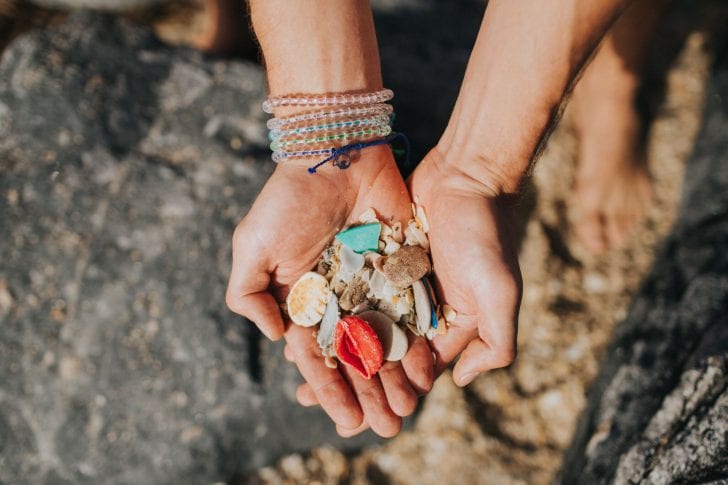Marine debris has been in the news and social media quite a bit recently. We’ve all seen posts of the Great Pacific garbage patch, also described as the Pacific trash vortex. I recently shared a post from a BBC broadcast that described a colossal ‘sea of plastic’ stretching for miles that had been found floating in the Caribbean. I was shocked. A friend of mine commented that the post made him embarrassed to be a human being. I recall fishing offshore about a week after Hurricane Irma. I couldn’t believe all the debris floating among the weedlines. I don’t mean a sneaker, a bottle, litter that is not uncommon – but instead pulverized pieces of plastic of all colors mixed in with the litter and other debris. I started becoming more aware of articles about plastic debris making its way into the food chain.
Last month we published an article about an exhibit at Mounts Botanical Garden, “Washed Ashore – Art to save the sea”. This exhibit, which has traveled around the country, has 10 impressive sculptures made entirely of marine debris collected from beaches. Be sure to share the details of this exhibit with your friends and family.

Last month I visited with Ryan Dick of 4Ocean, based in Boca Raton, Florida, to learn about their mission. Friends Andrew Cooper and Alex Schultz were on a surf trip to Bali in 2015 and witnessed fisherman there motoring through trash in the water and coming back with hardly any fish at the end of the day. They wondered how they could change the dynamic of fishing, turning trash into a commodity. How great would it be to have some fisherman fish for trash instead of actual fish, cleaning our waters and sustaining our environment? After that trip, they came up with the idea for 4Ocean, paying captains and crews to remove the trash in our ocean and coastal areas through the sale of bracelets made of recycled material. By purchasing one bracelet, you are removing one pound of trash from the ocean. The idea took off and 4Ocean was launched in January of 2017.
In the past year, their team collected over 212,000 pounds of trash. They started with 2 employees and have grown to 43, with 8 full time captains and 7 boats; 4 boats out on the water every single day in 4 different locations. The primary locations for the ocean cleanups are currently on the East Coast of Florida from West Palm Beach to North Miami, but they have hosted cleanups in 12 countries around the world as well. Their goal is to become the world’s largest ocean cleanup company by expanding the boat fleets and cleanup stations across the US and internationally.
4Ocean has three different cleanup methods: the daily offshore/intracoastal cleanups, beach cleanups and working with various cleanup organizations around the world. Once trash is removed after a cleanup, it is taken back to 4Ocean’s 8,000 square foot cleanup facility where it is cleaned, sorted and then taken to a recycling center or certified waste facility.

Plastic is ending up in our oceans on a massive scale. The problem with this is the ingestion of microplastics by fish populations worldwide. Many people that eat fish are now consuming and digesting these microplastics back into their bodies. The trash from our communities is making its way into the ocean and back into us! Floating trash islands are forming all over the world that are harming our marine life.
How can you get involved? Join the movement by purchasing one of the 4Ocean bracelets for $20 by going to their website www.4ocean.com. When you purchase a bracelet, you will remove one pound of trash from the ocean. The bracelets are made of 100% post-consumer recycled material. The beads are made from recycled glass bottles & the cord is made from recycled plastic water bottles. 4Ocean will offer a Limited-Edition Bracelet each month in 2018 for the public to purchase that helps raise awareness and money for other important marine causes around the world as well as pulling 1 pound of trash from the ocean.
Of course, it is always important to bring your trash home when you are out on the water. And why not whip out the net and rescue any floating debris you may pass when you are out fishing, once you’ve determined there is not a bull dolphin under it!